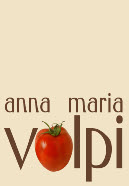


our Italian Cooking
Newsletter








DISCLAIMER and
PRIVACY POLICY
before using
our site
-
Advertise with us
site map
recipes
policies
about us


Extra-
The Best Selection of Italian Extra-
Buy from the source Authentic Aged Traditional Balsamic Vinegar from Italy
Sicily, Apulia, Lazio, Liguria, and More...The Best Selection of Succulent Italian Olives Oil
Infused Extra-
Spice up your dishes with Infused Flavored Italian Extra-

I don’t remember when it was that I became ardent about food, or at what point in my life I caught my “cooking fever.” I always was fascinated by food: mesmerized by the mixes, the manipulation, the infinite tastes, fragrances, and colors; and by the transformation of flour into the innumerable forms and textures once combined with water and shaped by fire.
When I was a child, my mother, sisters, and I went for our summer vacation to a country
home in a small town just north of Rome. A medieval abbey built upon the rocks deep
in the valley, a castle, and an old bridge evoked a sense of history and time. The
austerity and nobility of the environment contrasted sharply with the simplicity
of the lives of our neighbors, the peasants. Their lives appeared to be flowing in
slow motion, yet in harmony with nature. They repeated the same gestures year after
year, busy in their day-
Baking bread was a big deal. Every other week the wood-
Back at home in Rome, when anybody was in the kitchen, I was there too, looking,
asking questions, and listening to the never-
One wintertime evening visit, when I walked in the door that she normally left ajar so that I didn’t even have to knock, she shouted from the kitchen, “Hurry up. Close the door.” I saw something on the table, covered with a blanket. She furtively lifted an edge, finally breaking the suspense, and showed me . . . doughnuts! She was protecting them from the cold temperature while waiting for them to rise. In the years that followed, I must have fried her doughnuts a thousand times and never tired of seeing peoples’ expressions of pleasure and satisfaction while they ate them.
My work experiences and travels added to my capabilities with food. Like me, many people, as they become more skilled, want to experiment with increasingly sophisticated preparations. As I became more ambitious, I wanted to demonstrate that I could “make it.” Later, I realized that the most difficult dishes are not those with a long list of expensive components, but those where very few flavors participate. I learned from my father to give careful attention to the basic ingredients, a meticulous precision for the perfect dish of pasta or roast, and, in general, a love for simplicity. The greatness of Italian gastronomy is not in strange, unusual combinations: Foreigners often are surprised by the minimalism of Italian cooking, which is based mainly on fresh and tasty ingredients.
I don’t even consider myself a “chef,” a term that should be reserved for the professionals working in the kitchens of restaurants. Like most of my readers and students, I am basically someone with a love for sharing food, which is an ancient way to communicate: Sitting together at the table unifies a family and draws friends together. Cooking is not merely a matter of processing food; rather it is like a language with thousands of dialects, each dish a word that needs its proper spelling. Like a language, cooking is a product of the territory, and that is why we don’t have to be surprised if every Italian considers cooking a form of expression, fully integrated in their culture. As is true with language, cooking has deep roots in history, and a person’s knowledge of how the meals they eat have evolved imbues those dishes with new meaning.
In an age when fast food competes to take away the joy from the kitchen, we think it is important to look back and reflect on the significance of our great cooking traditions. The attentive cook needs to approach traditional cooking with respect for those before who for centuries lit the fire, prepared these dishes, and contributed to their evolution. By understanding these recipes, you can further adapt the old ways to fit your lifestyle.
This website is dedicated to all people who enjoy cooking and are especially fond of Italian cuisine. I hope you will enjoy cooking together,
Buona Cucina! Anna Maria
Well, although perhaps not an obsession, food certainly is a national passion—part of a zeal for living well, enjoying life.

After you try some of Anna Maria’s recipes, you will understand why her friends and family in Italy nicknamed her dolce forno (sweet oven) for her incomparable baking abilities.
A Passion for Cooking


PROFESSIONALE
CUOCHI ITALIANI
Someone said that all Italians have an “obsession with food.” Begin a conversation with Italians and in a few minutes they will be talking about the wonders of the food of their hometowns.
